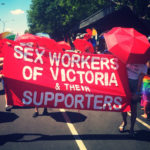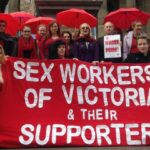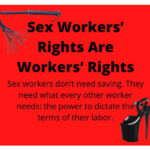Sex Workers Unite to Condemn Racist Raids Against Asian Migrant Workers in Brothels
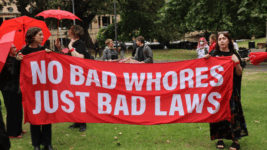
Sex workers and their allies gathered on Gadigal land in Sydney’s Belmore Park on Tuesday, 28 October 2025, to call out ongoing nationwide brothels raids that are part of the Australian Border Force-led Operation Inglenook, which is a government policy that results in young Asian women migrants specifically being turned away at the border, or tossed in immigration detention.
The stated aims of Operation Inglenook are to crackdown on the exploitation of the temporary visa system and human trafficking. Those gathered in the park on Tuesday, outlined that what this means is that unannounced late night raids on brothels, with armed state or federal police officers storming rooms mid-service, cancelling visas on the spot and workers being thrown in immigration detention.
National peak sex worker body, the Scarlett Alliance hosted the Stop the Raids, End Racial Profiling, Close the Detention Centres, Fair Visa Access for Workers rally. The demonstration prominently featured speakers from the Asian Migrant Sex Worker Advisory Group (AMSWAG), which is an offshoot of Scarlett Alliance that has been prominently campaigning against this crackdown.
On paper, Operation Inglenook is colourblind. The ABF can turn away any foreign national at the border, if they’re suspected of arriving here to conduct sex work illegally, and this is the reasoning behind the government raids on brothels.
How this plays out on the ground, however, is dozens of young Asian women are being turned away at the border and traumatised on execution of a warrant at their place of work.
The sex worker representatives who spoke on Tuesday further warned that these operations have been emboldened by the recent uptick in white nationalism. The targeting of the sex industry has dramatically escalated in Naarm-Melbourne over 2025, with 18 raids on brothels occurring so far, and since the major 31 August antiimmigration rallies, the raids are now taking place once a week.
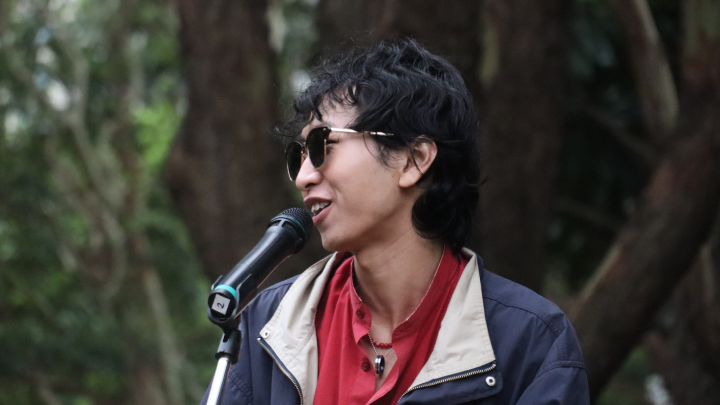
A climate of fear
“Today, we are gathered to demand the following: one, end racially targeted compliance operations and workplace raids, two, establish a fair visa pathway for migrant workers, three, end racial profiling at the border and finally, to close offshore detention centres and allow people awaiting visa outcomes to live safely in the community,” said AMSWAG spokesperson Damien.
Sydney Criminal Lawyers spoke to sex workers from NSW, Victoria and the Northern Territory at the rally. Despite sex work being decriminalised in these jurisdictions, as well as Queensland, federal and state agents consider it legitimate to raid them in respect of migrants working illegally, specifically looking for Asian people. Other workplaces in Australia are not subjected to such operations.
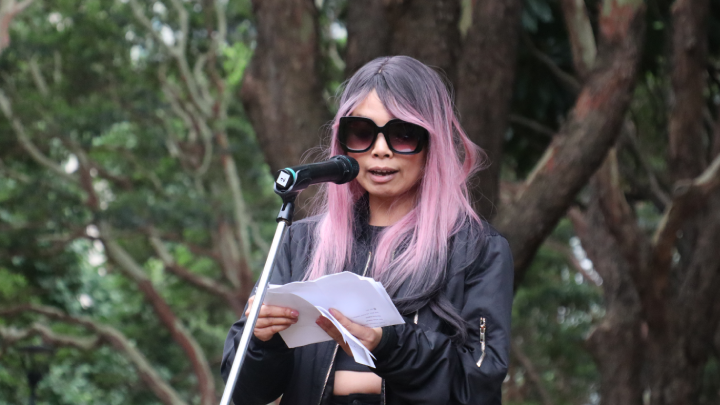
“Across NSW, police have raided sex worker workplaces, arriving forcefully, bursting through doors, spreading fear,” said SWOP NSW outreach worker Amelie. “Let’s be clear, in NSW, these are state police operations. In Victoria and the Northern Territory, immigration has detained and deported, with different reasons and the same result: fear and silence. Raids don’t build safety, they destroy it.”
“Raids make workers afraid to open the door to outreach to seek healthcare and to call for help when violence happens,” said the representative from the NSW peer sex worker organisation. “We refuse to let NSW become another Victoria. We refuse to let fear replace safety. We refuse to let raids silence our community.”
According to Amelie, whilst the authorities posit that the raids by immigration and federal and state law enforcement are about worker safety, brothels and massage parlours are now operating in a state of fear, which means those operating such establishments are now reluctant to open the door, even when it is an outreach worker attempting to provide peer health support to fellow workers.
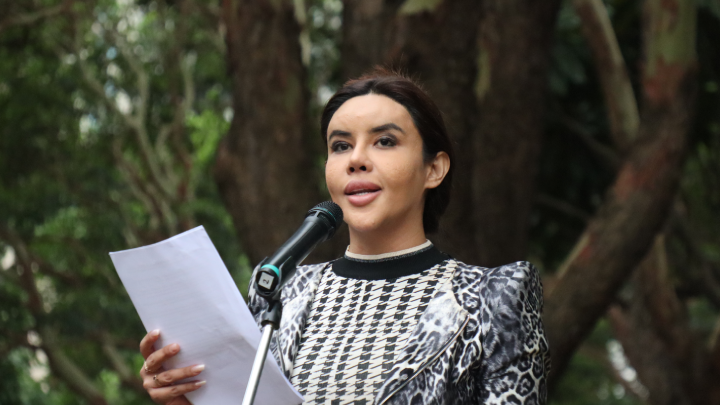
Inglenook statistics
Scarlet Alliance migrant policy analyst Aysha Zaharin outlined that peer group SWOP NT wrote to the Home Affairs Department in May 2024, asking for the Operation Inglenook operational guidelines. This query was forwarded to the ABF and comment was not forthcoming. Instead, on 24 December last year, it promised to review its operations, and get back in touch, but it failed to do this.
In March 2025, Victorian sex worker organisation Vixen then asked Home Affairs why these agents of the state are raiding decriminalised workplaces. The ABF said the raids on brothels were normal and added that Operation Inglenook was ended on 31 December 2024, although the task force continues.
Border Force added that the guidelines could be obtained via freedom of information. However, the sex workers “did one better”, and they went to Independent Senator Lidia Thorpe, who on request, assisted them in uncovering what was going on via federal parliament.
“This is what we know,” outlined Zaharin, “Border Force has conducted over 200 activities targeting sex workers in workplaces in so-called Australia since 2022, detaining and deporting at least 30 people that we know of.” The analyst added that Inglenook has resulted in over 200 people being turned back on arrival in Australia, on suspicion of having arrived in the country to conduct sex work.
Zaharin explained that when people are turned back, they’re held in immigration detention, on average, for a week. In the first 12 months of Inglenook, 98 migrants were detained: 88 percent were women, 59 percent were 29 years old or younger and 53 percent were from Japan. The second year saw 169 deportees: 93 percent were women, 73 percent under 29 and 52 percent were from Japan.
AMSWAG was involved in an attempt to secure the release of four Asian trans women who were being held in Villawood Immigration Detention Centre in October 2024. These women, who had been profiled at the border and detained, were being held in the male section of the facility. Since that time, the campaigners have been successful in securing the release of three of them.
“What we found out from the evidence,” Zaharin continued, “is that these actions are targeting Asian young women by seriously profiling us, while not targeting women from America or Europe, which resulted in trans women sex workers being held in the male detention facility, being denied gender-affirming healthcare, subjected to sexual harassment and having their human rights denied.”
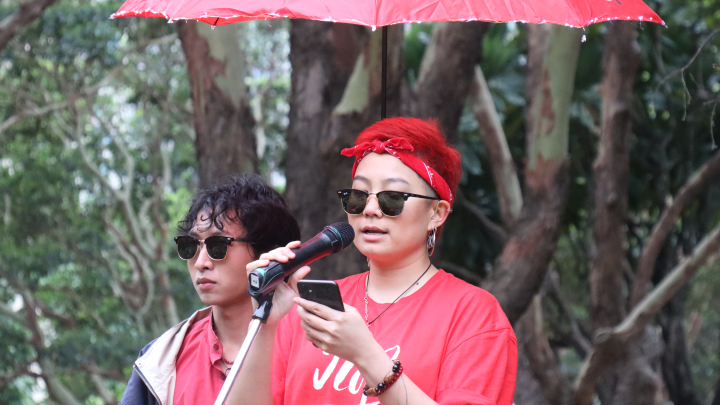
Ending the raids
Bee Charika is the Asian migrant lead at Victorian peer sex worker organisation Vixen. She is also running Vixen’s current Rising Red Lantern campaign, which is raising awareness about the proliferation of raids under Inglenook, in the southern city. She underscored that there’s been one brothel raid a week, since neo-Nazis marched on Melbourne in August.
“We are here to name the violence. The violence of the police. The violence of immigration raids, and the violence of the silence imposed by the state,” Charika explained. “The violence of the legal and court system, where we are treated as less valuable than others. Since January, there have been at least 18 raids in Victoria, with 11 workers having had their visas cancelled on the spot.”
“We are also deeply concerned that during August and September, after antiimmigration protests or the Nazi protests on 31 August, we saw the rate of raids increase. Over August and September, the raids have been happening once a week in Victoria,” the sex work advocate continued. “We also stand with the workers across Australia, where sex work is still criminalised.”
Amnesty International and other rights organisations maintain that the decriminalisation of sex work is the best model in terms of upholding sex worker rights and in maintaining sex worker health.
The state of New South Wales was the first jurisdiction on the planet to decriminalise sex work in 1995. The Northern Territory passed decriminalisation laws in 2019, which took effect in November 2020. The state of Victoria decriminalised its sex work industry in late 2022, while sex work decriminalisation laws passed in Queensland in May 2024 and took effect as in August last year.
Another key issue for sex workers in NSW is that despite a long campaign to see otherwise, antidiscrimination laws do not protect sex workers, who are working in a legitimate industry, yet suffer from grave stigma. The last year passed omnibus Equality Bill initially had such protections within its draft. However, this was one the details dropped, so the Minns government could pass it.
“We are here because the Border Force is targeting our community: Asian migrant women and trans women. We are here because they try to silence us,” Charika continued. “We are here because we are done with this violence.”
“They say this is about stopping trafficking, but we know better,” the peer worker said in conclusion. “It is not about protection. It is about control and punishment. It is antiimmigrant and it is about deporting sex workers and using our pain to get more money into their department.”




